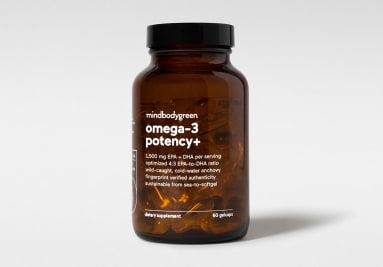This Fatty Acid Improves Working Memory & Diverse Facets Of Neurocognitive Health*



The fat-free diet craze of the '80s and '90s is far behind us (and thank goodness for that), but fat still gets a bad rap from time to time. Fatty acids are crucial to so many physiological processes, though, and deserve recognition for all the important work they do in the body.
Take brain function, for example: 60% of the human brain is made up of fat1, making it the fattiest organ in the body. Just like we need to stay hydrated because 60% of our bodies are made up of water, the nervous system needs fat—and DHA is one standout omega-3 fatty acid that works overtime to make sure the brain is getting the support it needs to operate at full capacity.*
What is DHA?
Docosahexaenoic acid (DHA) is a polyunsaturated fatty acid (PUFA) and one of the three main types of omega-3s (along with EPA and ALA). While omega-3s are tied to a number of health benefits, DHA plays a special role in cognitive health and function.*
Brain health benefits of DHA.
When we say this fatty acid seriously benefits the brain, we aren't kidding: Primarily located in neuronal membranes of the brain's gray matter (the area that processes information), DHA is the main PUFA in the brain and is involved in everything from working memory and planning to protecting neurons from oxidative stress.*
Furthermore, DHA strengthens general neuroprotection (i.e., maintaining the structure and function of neurons) and supports the brain's inflammatory and immune responses—in other words, it's a multitasking superstar at helping the nervous system operate well.*
DHA supports cognitive performance throughout life.
In addition to its diverse layers of brain health support, DHA has some especially important jobs throughout the entire lifespan.* (We're talking from womb to golden years, here!) All stages of life require DHA to support brain growth, development, and function—which is why scientists recommend all healthy individuals include DHA in their diets2 (and/or through supplementation) for optimal neurocognitive health and function at every age.*
Here are some of the clinically researched, age-specific benefits associated with adequate levels of DHA intake:
- Infants of women who take DHA supplements during pregnancy have significantly better problem-solving skills at 9 months old3.*
- Toddlers whose mothers supplement with EPA and DHA during pregnancy demonstrate higher eye and hand coordination scores4.*
- DHA supplementation improves cognition, behavior, and academic performance5 in school-age children.*
- College-age students see improvement in memory and verbal learning6 after just four weeks of EPA and DHA supplementation.*
- Adults that take daily doses of DHA above 580 milligrams experience improved episodic memory7 (i.e., the ability to recall specific experiences from one's personal past).*
- Weekly consumption of one serving of fish or more increases gray matter in older adults8.*
- Dietary DHA protects cognitive function and promotes mental acuity in older age9.*
The bottom line.
When it comes to our brains, DHA is vital throughout the lifespan. It's important to get adequate amounts of EPA and DHA daily (the minimum is 250 to 500 milligrams per day) to ensure you're giving your brain all the fatty acids it needs to operate at full capacity—now and down the line.*
DHA is primarily found in fish, so consider introducing two servings or more of oily fish a week (per the Dietary Guidelines for Americans) to meet baseline omega-3 fatty acid needs. As nutrition scientist Ashley Jordan Ferira, Ph.D., RDN, explains, however, "To reap the full-on benefits of marine omega-3s for brain, heart, and whole-body health, science indicates a higher dose (1 gram plus) of EPA plus DHA each day is where it's at. That's like eating 7 servings of oily fish a week, mind you."*
For these higher omega-3 levels, consider leveraging a premium-quality, sustainably sourced, health-expert-approved fish oil supplement with third-party verified traceability like mbg's omega-3 potency+. This daily essential delivers a potent 1.5 grams of EPA plus DHA (that's the omega-3 equivalent of one serving of fish per day!) so that meeting your omega-3 needs isn't another fish for you to fry.†

Morgan Chamberlain is a supplement editor at mindbodygreen. She graduated from Syracuse University with a Bachelor of Science degree in magazine journalism and a minor in nutrition. Chamberlain believes in taking small steps to improve your well-being—whether that means eating more plant-based foods, checking in with a therapist weekly, or spending quality time with your closest friends. When she isn’t typing away furiously at her keyboard, you can find her cooking in the kitchen, hanging outside, or doing a vinyasa flow.
9 Sources
- https://pubmed.ncbi.nlm.nih.gov/20329590/
- https://www.ncbi.nlm.nih.gov/labs/pmc/articles/PMC4113767/
- https://pubmed.ncbi.nlm.nih.gov/17556695/
- https://pubmed.ncbi.nlm.nih.gov/17185423/
- https://www.mdpi.com/2072-6643/5/7/2777
- https://pubmed.ncbi.nlm.nih.gov/22250656/
- https://pubmed.ncbi.nlm.nih.gov/25786262/
- https://pubmed.ncbi.nlm.nih.gov/25084680/
- https://www.cambridge.org/core/journals/nutrition-research-reviews/article/dietary-dha-and-health-cognitive-function-ageing/1DC26922C905D4C150EF21282C9AA054

